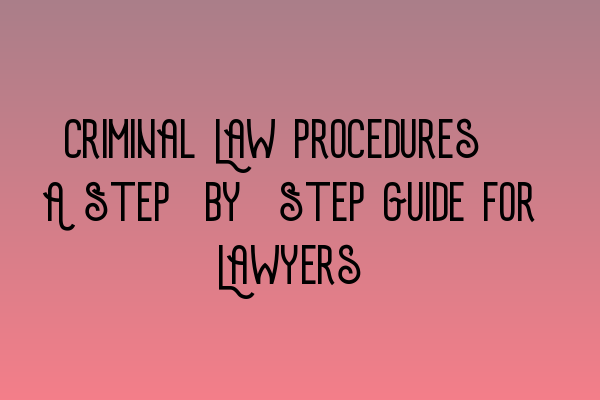Criminal Law Procedures: A Step-by-Step Guide for Lawyers
Welcome to SQE Criminal Law & Practice Law UK, where we provide expert advice and guidance to lawyers and aspiring solicitors. In this comprehensive guide, we will walk you through the step-by-step procedures in criminal law, ensuring that you have a clear understanding of how the legal process unfolds. Whether you are a seasoned lawyer or a law student preparing for the SQE exam, this article will serve as an invaluable resource.
Understanding the Criminal Law Process
In criminal law, it is crucial to have a strong grasp of the various stages and procedures involved. This knowledge enables lawyers to effectively represent their clients and navigate the complexities of the criminal justice system.
The criminal law process begins with the initial investigation, conducted by law enforcement agencies, where evidence is gathered and suspects are identified. This leads to the next phase, where charges are filed by the prosecuting authority, initiating the legal proceedings.
Once charges are filed, the accused is brought before a court for the arraignment, where they are formally informed of the charges against them and enter a plea. It is during this stage that a defense attorney plays a critical role in advising their client and crafting a strategic defense strategy.
If the case proceeds to trial, the discovery process takes place wherein both the prosecution and defense exchange evidence and information. This step is essential for building a strong case and evaluating the strengths and weaknesses of the evidence presented.
Following the discovery process, the trial begins. This is the stage where the evidence is presented, witnesses are examined and cross-examined, and arguments are made by both sides. A skilled lawyer must possess strong courtroom advocacy skills and be well-versed in criminal law principles to effectively represent their client.
After the trial, the jury (in cases where a jury is present) deliberates and delivers a verdict. If the accused is found guilty, the sentencing phase commences, where the court determines the appropriate punishment based on various considerations.
It is important to note that the above process is a simplified overview of the criminal law procedures. In reality, each case may have its unique factors and complexities that require the expertise of a qualified lawyer.
Importance of Legal Representation
Having legal representation is crucial for individuals facing criminal charges. A skilled defense attorney can challenge the prosecution’s evidence, protect their client’s rights, and build a robust defense strategy.
If you are an aspiring solicitor looking for valuable resources to enhance your knowledge in criminal law, our SQE Exam Prep: Essential Study Materials for Aspiring Solicitors article provides comprehensive study materials to help you excel in your legal career.
Conclusion
Navigating the criminal law procedures requires a deep understanding of the legal process and a strategic approach. As a lawyer, staying updated with the latest developments and honing your skills in criminal law is essential to provide effective representation to your clients.
If you are seeking expert advice and guidance in criminal law, kindly reach out to our team at SQE Criminal Law & Practice Law UK. We are dedicated to assisting lawyers and solicitors in enhancing their legal expertise in criminal law.
For more related articles on legal representation, ethical business practices, and overcoming legal challenges for businesses, we recommend checking out the following resources:
- Legal Representation for Delaware LLCs in the UK: Expert Advice
- Ensuring Ethical Business Practices: Delaware’s Code of Conduct
- Legal Challenges for UK Businesses in the U.S.: Strategies for Overcoming Hurdles
- Legal Challenges for UK Businesses in the U.S.: Strategies for Overcoming Hurdles
